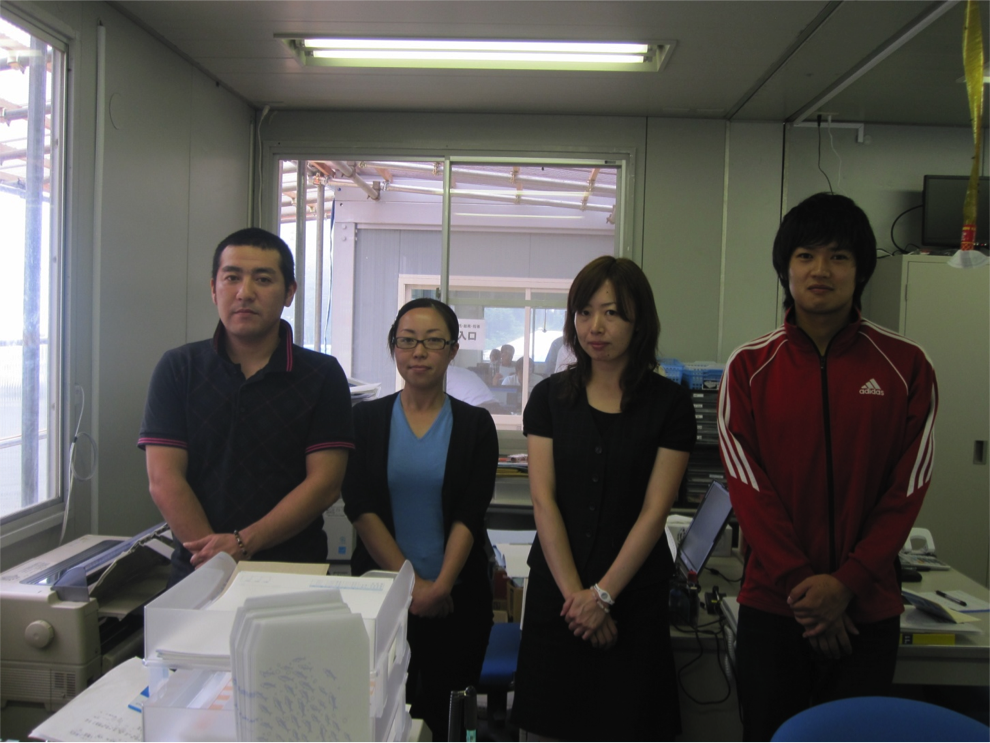By Mariko Poorman | Project Officer
Peace Winds America (PWA) thanks all the donors who have supported our Fishery Recovery Project. This is our last project report, and we wanted to share our latest accomplishments and how you helped fishing communities in Tohoku region.
Abalone fishing traditional way:
Abalone fishing begins at dawn. Fishermen navigate their boats to the harvest area, and catch abalone that are tightly stuck to the sea floor using water glasses and a specialized rod and hook. Great skill is required to handle the rod while controlling the boat in order to have a good catch. Abalone fishing is mostly done individually, and fishermen enjoy the friendly competition of the abalone harvest.
Bad weather, no boat, low market price, and harmful rumors – Nothing will keep Minamisanriku fishermen from going back to sea!
The Abalone season officially opened in November 2012. During a normal season, there are five to six harvest days. However each abalone harvest region only had three harvest days in 2012 due to bad weather.
This season the abalone trading price was down 30% from previous fishing seasons. No abalone was harvested last year due to the disaster, so abalone from other areas have taken Minamisanriku’s market share. Moreover harmful rumors caused by the Fukushima nuclear crisis must have had an influence.
Additionally many fishermen still have not been able to replace their fishing boats damaged or lost during the tsunami. Some fishermen were willing to share their surviving or newly-acquired vessels with those without, but demand for boats overwhelmed the supply during the harvest.
Despite fewer harvesting days and fewer boats, the two fishing cooperatives were able to harvest almost as much as in 2010 (before the tsunami)! What a great success!
Over 600 fishermen participated in the PWA subsidy program!
A total of 571 fishermen purchased abalone equipment through the PWA subsidy program. PWA also extended support for sea urchin equipment since it only required replacing one component of the abalone equipment. An additional 118 fishermen took advantage of our sea urchin equipment program.
Ultimately the PWA equipment subsidy program played important role in this year’s harvest. Reduced equipment costs allowed more fishermen to participate resulting in additional income from the abalone harvest.
PWA continues supporting fishermen in Minamisanriku:
Though this project is finished, Peace Winds America will continue helping fishermen in Minamisanriku.
PWA’s successful fishing shed program is now expanding to new districts! This project helps fishing families who lost their homes, work spaces and fishing equipment. By providing these families with a fishing shed (their base of operations), the families are able focus their resources on livelihood recovery and stabilization.
You can support fishing families who lost everything in the disaster. Please visit our new project site: https://www.globalgiving.org/projects/sheds-for-japan-tsunami-fishing-families
Thank You for Supporting Fishing Communities in Tsunami Affected Areas!!
Why help fishermen?
Peace Winds America has helped Minamisanriku since the immediate aftermath of the disaster. This created a strong bond between the people in this town and PWA. We immediately recognized the importance of supporting the fishing industry as it is the economic backbone and the livelihood for the majority of Minamisanriku’s citizens. It was natural for PWA to continue working with them to transition from emergency relief to recovery of the area. For two years we have been working closely with two fishing cooperatives in Minamisanriku: Utatsu and Shizugawa. With a good understanding of the history and culture of the fishing industry, we have been able to identify rapidly changing local needs and provide effective recovery projects.
Links:
By Mariko Poorman | Project Officer
By Patrick Schmitt | Project Officer
Project reports on GlobalGiving are posted directly to globalgiving.org by Project Leaders as they are completed, generally every 3-4 months. To protect the integrity of these documents, GlobalGiving does not alter them; therefore you may find some language or formatting issues.
If you donate to this project or have donated to this project, you can receive an email when this project posts a report. You can also subscribe for reports without donating.
